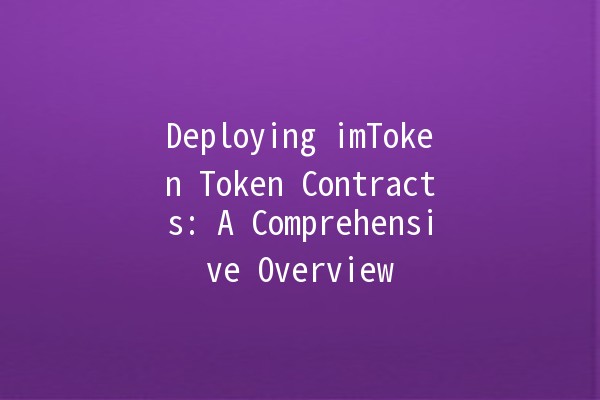The growing importance of blockchain technology has led to innovative solutions, notably in the realm of token creation and management. Among the prominent players in this field, imToken stands out as a robust digital wallet allowing users to interact with various blockchain networks. In this article, we will explore the deployment of imToken token contracts, providing practical tips and techniques that can enhance user productivity when working with token contracts.
Token contracts are smart contracts deployed on blockchain platforms that define the rules and characteristics of tokens. Generally, they govern how tokens are created, transferred, and interacted with within a particular ecosystem.

Deploying token contracts allows developers to create unique digital assets that can be used within decentralized applications (dApps). These tokens are essential for representing assets, voting rights, and utilities within blockchain platforms.
ImToken offers an intuitive interface that simplifies the process of managing digital assets. It is easy to navigate, making it accessible to both novice and experienced users. This reduces the learning curve for new adopters, fostering increased participation in blockchain activities.
Security is paramount in the world of cryptocurrencies. ImToken employs advanced security features, including hardware wallet support and recovery options. This ensures that users’ digital assets are protected against hacks and unauthorized access.
ImToken supports various blockchain networks, including Ethereum and others. This versatility allows users to deploy token contracts across multiple platforms, broadening their applications and potential user base.
Before deploying a token contract on imToken, it’s crucial to identify its purpose clearly. Determine whether your token will represent utility, equity, or a hybrid model.
Example: If you are developing a voting platform, creating a governance token that allows token holders to vote on proposals would be beneficial.
Leverage wellestablished standards like ERC20 or ERC721 to enhance compatibility and interoperability with other dApps and wallets.
Example: By following the ERC20 standard, your token will be recognized by various exchanges and wallets, increasing its liquidity and usability.
Deploying untested smart contracts can lead to bugs and vulnerabilities. Utilize testnets to deploy your token contracts in a controlled environment.
Example: Use Ethereum’s Rinkeby or Ropsten testnet to deploy and interact with your token contract before going live.
Gas fees can significantly impact the usability of your token. Optimize smart contract code to reduce gas consumption during transactions.
Example: Reduce the complexity of your functions, or consider batch processing transactions to lower overall gas fees.
Stay informed about local regulations concerning cryptocurrency and token usage. Noncompliance can lead to penalties or project shutdowns.
Example: Consult legal professionals to ensure your token's use case complies with the necessary regulations in the jurisdictions where you operate.
Fungible tokens are interchangeable and identical, like currency (e.g., ERC20 tokens). Nonfungible tokens (NFTs) represent unique items or assets, making them distinct (e.g., ERC721 tokens).
You can manage your tokens by importing your wallet address into the imToken app. Once added, you can view, transfer, and analyze tokenrelated data.
Common pitfalls include inadequate smart contract testing, ignoring gas optimization, and overlooking regulatory compliance. Each of these mistakes can hinder your project’s success.
Yes, smart contracts are immutable once deployed; however, you can implement upgradeable contracts to allow for future enhancements.
Implement best practices such as code audits, thorough testing, and employing security measures like multisignature wallets to safeguard against vulnerabilities.
Generally, yes; however, ensure that the exchanges support your token's standard (ERC20 or ERC721) and that the relevant security protocols are in place.
Deploying imToken token contracts entails understanding the nuances of smart contracts, token standards, and regulatory compliance. By leveraging the benefits of imToken’s platform, users can efficiently create and manage their digital assets while considering their use cases and optimizing for security.
Whether you are developing a new utility token or exploring innovative applications within the blockchain realm, following the outlined techniques will facilitate a smoother deployment process and enhance user engagement.
As the blockchain space continues to evolve, so too will the strategies for successfully deploying token contracts. Stay updated with new developments, and embrace the dynamic nature of this technology to maximize your potential in the digital asset ecosystem.